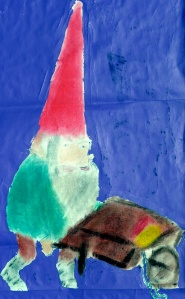
In Rumplestiltskin a miller brags that his daughter can spin straw into gold, and she’s locked in a stable by the king, where she must do the promised deed, or die. Rumplestiltskin does the magic for the girl and she is made queen. When Rumplestiltskin later comes to claim her first-born child, she manages to learn his name and undo the spell—thus she benefits from the treasure of the gold, and gets to keep her truest treasure, her child. One intriguing thing about this fairytale is that “straw” is code for “poop,” as the straw in a stable is where the animals’ poop ends up.
Parenting makes life, at times, into a potty joke (i.e. my colicky newborn literally pooping on “How to Calm the Fussy Baby,” his first response to the parenting self-help literature). Yet we parents can learn, via attitude adjustment, to transform this poop into gold.
Alchemy is the ancient art of turning lead (the toxic poop of metals) into gold, and while this may not be literally possible, it is a powerful metaphor of individuation. Parenting is a sort of alchemy—a process where the parent is put through the crucible of raising children and, if one stays the course, is himself, or herself, turned into the gold of being their best Selves. If poop can symbolically serve as raw material for making spirit gold, then parenting, at first literally by the diaper load, and later metaphorically by the truckload of attitude, is a potential mother lode of treasure.
In The Alchemist, by Paulo Coelho, the hero goes on a quest for treasure where he gains wisdom and knowledge and ultimately realizes that the treasure is hidden right where he began (yet he needed the insight of the journey to know how to unlock that treasure). This reminds us that our treasure is right under our noses, in the mundane and seemingly worthless corners of our messy lives.
All wealth is ultimately spiritual wealth. Thus some humans amass treasure and yet are poor of spirit and unhappy, while others appear to have little and yet are happy—rich in spirit. Parenting is a journey that potentially teaches us the magic of turning what would seem like “poop” (unwanted feelings of sleep-deprivation, inadequacy, anger, doubt, frustration, money worries and difficult decisions) into true “gold”—the treasure of Good Feelings That Last.
Young kids instinctively understand that there is gold in their poop, and they are frequently reluctant to put it in the toilet, preferring to keep it safe and nearby in their diapers. If we learn from our pre-shame children to see again with child-mind, without judgment, to the subtle heart of things, we learn to see the sacred treasure that pulses in every dropping of dung along the trail of our lives, in every dark and stinky but passionate and real moment with our children. By the magic of our love, we transform our consciousness, individually and collectively, to discover that the treasure is all around us, in the way that things just are. Our children are exemplary teachers of this truth.
Seeing the gold in the poop doesn’t so much make us rich as it allows us to realize that we already are, and always were, “rich.” Then we are free to love, create, be… and live in our gratitude.
The lotus grows with its roots in the mud. Let’s dedicate today to finding the gold in our children’s “poop” that they dish out, literally and metaphorically.
Namaste, Bruce



{ 4 comments… read them below or add one }
Your analogies are right on. Couldn’t help but laugh out loud at the target of your newborn’s poop. Thanks!
Jordan MGH
I have been talking to a lovely person from my past who decided to take on the raising of her grandson, who has multiple problems from epilepsy, to significant learning challenges, to anger issues, probably stemming from his mother’s drug and alcohol abuse. She (the grandmother) is struggling with her exhaustion regarding coping with his recent 13 year old angry outbursts. This is the kind of adolescent “poop” that is quite difficult to spin into gold.
I challenge this community to support her, to offer any words of holding, as she tries to remain solid in her role as parent. She is a friend of PoP.
Yes, let’s send love and support. Also, with a case like this it serves to keep in mind that the child unconsciously tries to get the grandmother (and all other would-be caregivers) to reject that child (I have learned this in my work with group home kids). One interpretation is that the child maintains an idealized view of the parent (because we need an ideal parent, even if it is only in our imagination); and if the reality is that the mother abused substances and was unable to parent her child, that child will protect the image of the idealized mother by asserting, over and over, that they themselves are unlovable and un-parentable. One thing that can help, perhaps held by the group, is a deeper understanding of the child’s “poopy” behavior as a defense against the psychological annihilation that comes with facing the truth of the past: a beautiful and sacred child, utterly dependent on an impaired and severely limited parent. Laced in can be the guilt that the grandparent carries, as they can’t help but fear that they failed their child and are now possibly being offered another chance, along with a reminder of how truly hard it can be do parent in the face of our own limitations. Let’s dedicate this evening to this grandmother finding strength to be the bowl for the poop, for the mom who is not in the picture finding courage to heal, and for the boy to find the truth of his inherent worth and lovability. Namaste, Bruce
I’m going to dedicate my week to it. Great sentiment, and so true.
{ 2 trackbacks }